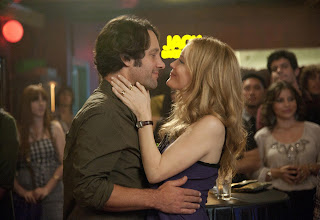This is 40
**½
out of ****
Directed by: Judd Apatow
Starring: Paul Rudd, Leslie Mann, Maude Apatow,
Iris Apatow and Albert Brooks
Running time: 134 minutes
Judd Apatow is having a mid-life crisis and he
is displaying it on film.
The comedy writer/producer/director started his
career dazing back at the years of fortuitous adolescence with TV shows Freaks
and Geeks and Undeclared. Then, he turned to telling stories about meek and wily
men-children growing into adults (Knocked Up, The 40-Year-Old Virgin). Since, he
has been stuck with more dour and painful comedies, touching on themes of neglect amidst the family in Funny People and, now, This is 40.
Apatow, whose most recent triumph comes as
producer (and occasional co-writer) of Lena Dunham’s excellent HBO dramedy
Girls, is starting to frame his films more like television shows. This is 40 is
largely episodic and often feels like the entire series of an inconsistent
cable comedy thrust onto a big screen. The director's style, notable for its improvisatory, leave-the-camera-rolling realism - think of him as a modern, culture-savvy Cassavetes - is starting to turn tiresome.
Nevertheless, This is 40 is quite funny and
usually painfully so, chronicling the staleness of marriage between Pete (Paul Rudd) and Debbie (Leslie Mann, Apatow's real wife), who first appeared as the best friends in Knocked Up. Their children, Sadie and Charlotte, also return. The kids have fantastic comedy chops, which makes sense since they are played by the director's actual offspring.
The film is bookended by the couple’s birthdays
– Debbie is in denial of turning 40 and so she turns the spotlight over to Pete’s
milestone. Throughout, it tracks chapters of the couple’s experiences as they
navigate through fussy children and financial strain.
Debbie, a boutique owner, has to figure out if
her sex-crazed shopgirl Desi (Megan Fox) has been stealing funds from the store.
Pete owns his own record label and is risking it all on selling a new album
from underappreciated rocker Graham Parker.
Meanwhile, their family isn’t giving them much comfort either. Pete has difficulty relating to
Sadie, his eldest, as she goes deeper through an infatuation of the hit TV
series Lost, while Debbie takes out her aggression on one of Sadie’s classmates after the boy insults her daughter on Facebook.
Moreover, the husband and wife try to
reconcile with their respective fathers, both of whom have remarried younger women and
have children as young as Sadie and Charlotte. These fathers, played by Albert
Brooks and John Lithgow, have intermittent relationships with their eldest
children and are focusing their energy on new families. Along these first weeks as forty-somethings,
the duo are constantly reminded not to blink as their lives unfold in front of
them, although Pete and Debbie are seeing collision after collision.
This is 40 doesn’t have the propulsive
narrative drive that some of Apatow’s other features have, and like many of them, runs a reel too long. The writer/director spreads around the chapters of Pete and Debbie’s lives so much that many of the scenes don't link to the ones before or after them. If any projectionist screening this film had switched
reels (that is, if there was still one working an actual film projector), the audience would likely not notice.
Ultimately, the film works because of Rudd and
Mann, who don’t just have prime comic timing but are terrific at changing their
pace to the film’s trickier dramatic territory. Pete and Debbie are,
inherently, deeply troubled characters who blame others for their financial,
marital and parental problems. Well, at least they have each other to point
fingers at. When a character remarks that Pete and Debbie are like a bland, artificial couple from a bank commercial, one can nod in approval of that cunning
one-liner
Overall, one’s tolerance of This is 40 may depend on how
much he or she enjoys spending time with two rich, rascally souls fretting about
parenthood. It is strange to see Pete crying in a 5-Series BMW
about the jeopardized future of his business. Ultimately, the film may work better as a satire of upper middle-class American families and their 'First World problems' than as the sharply observant comedy that Apatow intended. Mid-life crisis, not averted.





I think you were too generous with your rating of this film. Yes, I had a few laughs during the movie, but all in all I thought it was awful and a waste of my time.
ReplyDelete